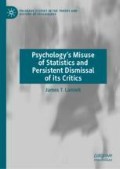Abstract
This chapter discusses the manifest incorrigibility of mainstream scientific psychology in the face of trenchant critiques of the long-standing practice of interpreting statistical research findings defined only for aggregates of subjects as if those findings warranted claims to scientific knowledge of individuals within the aggregates. It is argued that the untoward consequences of this practice, which are both epistemic and socio-ethical in nature, have historically been concealed by the custom of speaking and writing about aggregate statistical research findings in ways that conflate the distinction between frequentist and subjectivist understandings of probability. Mainstream psychology’s refusal to come to terms with this essentially conceptual problem is discussed in the light of a warning issued by Wilhelm Wundt more than a century ago that a psychology unmindful of the crucial role of conceptual inquiry in all of science would in time imperil its own existence.
Access this chapter
Tax calculation will be finalised at checkout
Purchases are for personal use only
References
Bakan, D. (1955). The general and the aggregate: A methodological distinction. Perceptual and Motor Skills, 5, 211–212.
Bakan, D. (1966). The test of significance in psychological research. Psychological Bulletin, 66, 423–437.
Bennett, M., & Hacker, P. M. S. (2003). Philosophical foundations of neuroscience. Oxford, UK: Blackwell.
Boring, E. G. (1950). A history of experimental psychology (2nd ed.). New York: Appleton-Century-Crofts.
Costa, R. E., & Shimp, C. P. (2011). Methods courses and texts in psychology: “Textbook science” and “tourist brochures”. American Psychologist, 31, 25–43. https://doi.org/10.1037/a0021575.
Cowles, M. (1989). Statistics in psychology: An historical perspective. Hillsdale, NJ: Lawrence Erlbaum Associates.
Cronbach, L. J. (1957). The two disciplines of scientific psychology. American Psychologist, 12, 671–684.
Danziger, K. (1990). Constructing the subject: Historical origins of psychological research. New York: Cambridge University Press.
Dilthey, W. (1894). Ideen über eine beschreibende und zergliedernde Psychologie [Ideas concerning a descriptive and an analytical psychology]. Sitzungsberichte der Akademie der Wissenschaften zu Berlin, 1309–1407. Zweiter Halbband.
Ebbinghaus, H. (1885). Über das Gedächtnis. Leipzig: Duncker & Humbolt.
Harré, R. (1981). The positivist-empiricist approach and its alternative. In P. Reason & J. Rowan (Eds.), Human inquiry: A sourcebook of new paradigm research (pp. 3–17). New York: Wiley.
Jüttemann, G. (Ed.). (2006). Wilhelm Wundts anderes Erbe: Ein Missverständnis lost sich auf. Göttingen: Vandenhoek & Ruprecht.
Kerlinger, F. N. (1979). Behavioral research: A conceptual approach. New York: Holt, Rinehart, & Winston.
Lamiell, J. T. (2003). Beyond individual and group differences: Human individuality, scientific psychology, and William Stern’s critical personalism. Thousand Oaks, CA: Sage.
Lamiell, J. T. (2013). On psychology’s struggle for existence: Some reflections on Wundt’s 1913 essay a century on. Journal of Theoretical and Philosophical Psychology, 33, 205–215. https://doi.org/10.1037/a0033460.
Lamiell, J. T. (2015). Statistical thinking in psychological research: In quest of clarity through historical inquiry and conceptual analysis. In J. Martin, J. Sugarman, & K. L. Slaney (Eds.), The Wiley handbook of theoretical and philosophical psychology: Methods, approaches, and new directions for social sciences (pp. 200–215). Hoboken, NJ: Wiley.
Lamiell, J. T. (2016). On the concept of ‘effects’ in contemporary psychological experimentation: A case study in the need for conceptual clarity and discursive precision. In R. Harré & F. Moghaddam (Eds.), Questioning causality: Scientific explorations of cause and consequence across social contexts (pp. 83–102). Santa Barbara, CA: Praeger.
Machado, A., & Silva, F. J. (2007). Toward a richer view of the scientific method: The role of conceptual analysis. American Psychologist, 62, 671–681. https://doi.org/10.1037/0003-066X.62.7.671.
Monitor on Psychology, A Publication of the American Psychological Association. November, 2016.
Münsterberg, H. (1913). Psychology and industrial efficiency. Boston and New York: Houghton-Mifflin.
Porter, T. R. (1986). The rise of statistical thinking: 1820–1900. Princeton, NJ: Princeton University Press.
Skinner, B. F. (1990). Can psychology be a science of mind? American Psychologist, 45, 1206–1210. https://doi.org/10.1037/0003-066X.45.11.1206.
Stern, W. (1900). Über Psychologie der individuellen Differenzen (Ideen zu einer “differentiellen Psychologie”) [On the psychology of individual differences (Toward a “differential psychology”)]. Leipzig: Barth.
Stern, W. (1911). Die Differentielle Psychologie in ihrer methodischen Grundlagen [Methodological foundations of differential psychology]. Leipzig: Barth.
Stern, W. (1927). Selbstdarstellung [Self-portrayal]. In R. Schmidt (Ed.), Philosophie der Gegenwart in Selbstdarstellungen (Vol. 6, pp. 128–184). Leipzig: Barth.
Venn, J. (1888). The logic of chance. London and New York: Macmillan.
Watson, J. B. (1928). The ways of behaviorism. New York: Harper and Brothers.
Windelband, W. (1894/1998). History and natural science (J. T. Lamiell, Trans.). Theory and Psychology, 8, 6–22.
Wundt, W. (1912). Elemente der Völkerpsychologie. Leipzig: Alfred Kröner Verlag.
Wundt, W. (2013). Psychology’s struggle for existence (J. T. Lamiell, Trans.). History of Psychology, 16, 195–209. https://doi.org/10.1037/0032319.
Author information
Authors and Affiliations
Corresponding author
Rights and permissions
Copyright information
© 2019 The Author(s)
About this chapter
Cite this chapter
Lamiell, J.T. (2019). Introduction: Mainstream Psychology’s Worrisome Incorrigibility. In: Psychology’s Misuse of Statistics and Persistent Dismissal of its Critics. Palgrave Studies in the Theory and History of Psychology. Palgrave Macmillan, Cham. https://doi.org/10.1007/978-3-030-12131-0_1
Download citation
DOI: https://doi.org/10.1007/978-3-030-12131-0_1
Published:
Publisher Name: Palgrave Macmillan, Cham
Print ISBN: 978-3-030-12130-3
Online ISBN: 978-3-030-12131-0
eBook Packages: Behavioral Science and PsychologyBehavioral Science and Psychology (R0)

